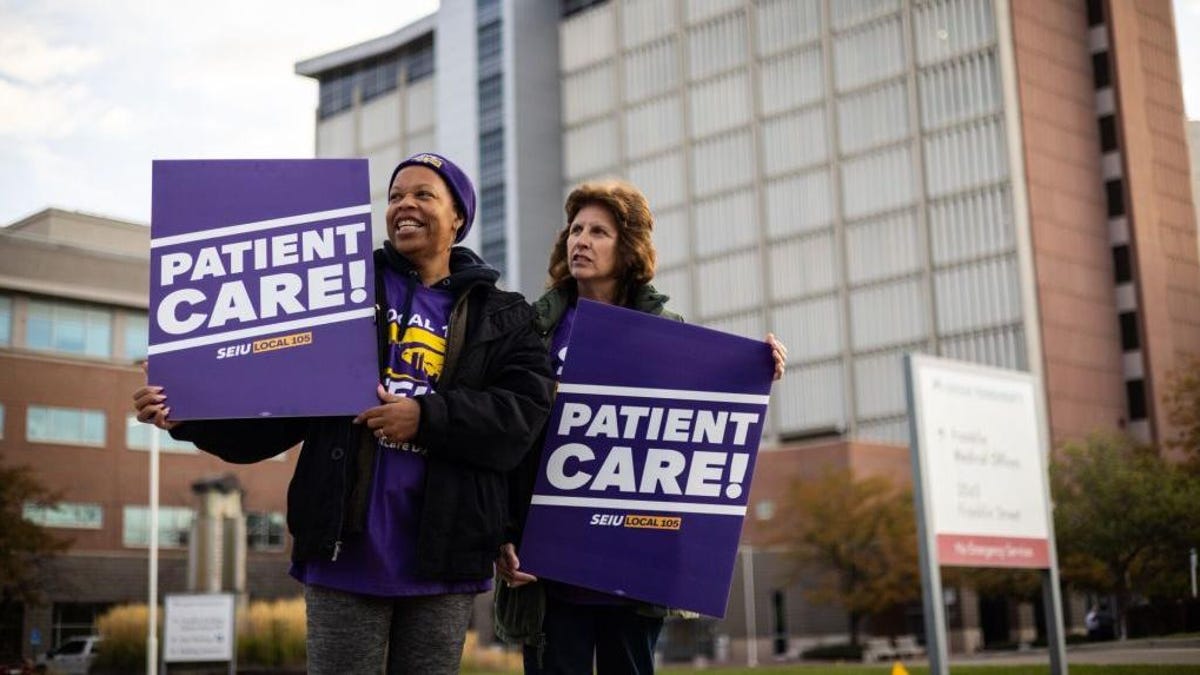
More than 75,000 Kaiser Permanente healthcare workers went on strike on Wednesday, adding to the growing list of strikes sweeping the nation this year. Healthcare workers threatened to go on strike after contract talks between union leaders and Kaiser stalled on Tuesday.
Healthcare strikers include licensed vocational nurses, ultrasound sonographers, radiology, X-ray, and surgical technicians, and home health aids. According to the Union Coalition, the strike will affect Kaiser medical offices and hospitals in California, Colorado, Virginia, Washington, DC, and Washington state.
Advertisement
The last Kaiser contract was issued in 2019 but conversations came to a standstill roughly 17 hours before the strike was scheduled to start, according to the Coalition, Reuters reported. The Coalition said in a press release that the strike is expected to run from Oct. 4 through Oct. 7 at 6 a.m., saying it “will be the initial demonstration of our strength to Kaiser that we will not stand for their unfair labor practices.”
Advertisement
A Kaiser Permanente spokesperson said in an email to Gizmodo that it is “still at the bargaining table” with Coalition Union representatives, “having worked through the night in an effort to reach an agreement.” The spokesperson added: “There has been a lot of progress, with agreements reached on several specific proposals late Tuesday.”
Advertisement
Healthcare workers are demanding higher pay, and union representatives asked Kaiser for a minimum of $25 per hour and a 6.5% raise each year for the first two years of the labor contract with another 5.75% raise for each of the two years after. Kaiser offered a maximum 4% raise, depending on location, on Oct 1, but the Union Coalition rejected the offer, saying it wasn’t competitive with the cost of living.
“Workers are really being squeezed right now,” Renee Saldana, a spokesperson for SEIU-UHW, told CNN. “They went through the worst global health crisis in a generation and then they come out and they’re worried about paying rent, they’re worried about losing their house, they’re worried about living in their cars.”
Advertisement
Kaiser Permanente told the outlet that it prepared for workers to go on strike and hired temporary nurses and other healthcare workers in the interim, but that patients with non-emergencies or elective procedures should expect delays or their appointments to be rescheduled.
“Our hospitals and emergency departments will remain open. Our facilities will continue to be staffed by our physicians, trained and experienced managers, and staff, and in some cases we will augment with contingent workers,” a Kaiser Permanente spokesperson told the outlet.
Advertisement
Caroline Lucas, executive director of the Coalition of Kaiser Permanente Unions told CNBC that the healthcare staffing shortage has led to unsafe working conditions and reduced quality care for patients.
“We continue to have front-line healthcare workers who are burnt out and stretched to the max and leaving the industry,” she told the outlet. “We have folks getting injured on the job because they’re trying to do too much and see too many people and work too quickly. It’s not a sustainable situation.”
Advertisement
The strike marks the largest for healthcare workers in U.S. history, according to the Union Coalition, and comes as strikes have broken out across the country including the automobile and entertainment industries.
Services Marketplace – Listings, Bookings & Reviews